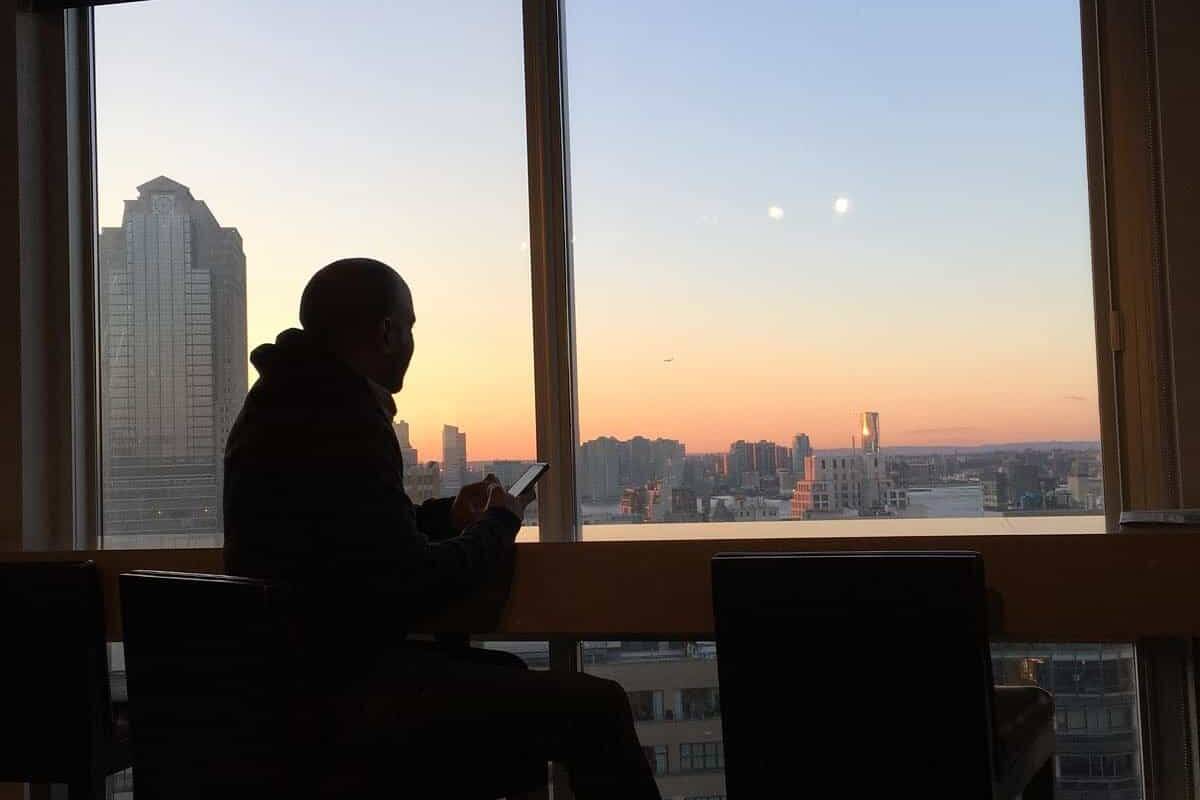Here we are, characters in the 2020 sequel we didn’t want, but apparently needed in the battle against the Covid-19 pandemic — Lockdown 2.
With months of disruption to our lives clocked-up already, and compounded financial anxiety, health-related stress, separation from our friends and family, and generally more limited freedom vs. 2019 life (all at a gloomy time of year for the Northern Hemisphere); you could say practices to help keep us mentally stronger, no matter how crazy the outside world gets, are key now more than ever.
Here are practical ideas to help keep your mind balanced during these challenging times:
1. Stay connected with your community
We intuitively (and scientifically) know that healthy relationships are key for our well-being. The 80-year Harvard Study of Adult Development found that close personal connections are key for happiness and longevity throughout life. Research also suggests that people who engage in supportive, positive relationships produce more oxytocin, which boosts our immune system, allow us to heal quicker, and makes us less likely to experience stress, anxiety, and depression.
When we can see our loved ones in real life, technology can make us feel more socially isolated (more on that later). During current lockdowns however, it’s a tool to help build the sense of community and connection that we miss. Imagine lockdown in a time when we couldn’t contact people we don’t live with — something to be grateful for!
Committing to speaking to someone who uplifts you every day can make all the difference; studies have shown that acting in an extroverted way can make people happier. Depending on how Zoom-adventurous you are, you can arrange to have a tea, play online games, run virtual book or movie clubs or even try creative activities like painting together with loved ones. After being particularly overzealous with video conferencing in the springtime, Zoom fatigue is something I definitely personally relate to however. At this point, I prefer good old fashioned phone calls instead!
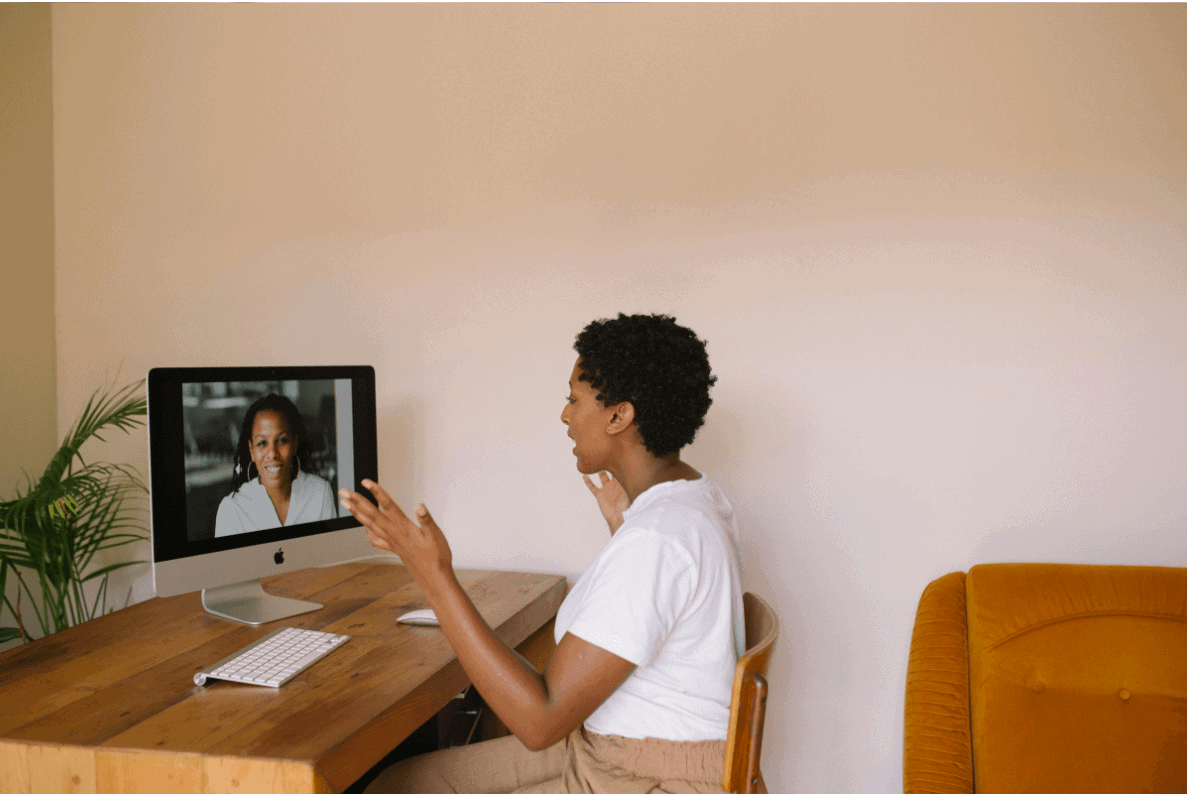
Social media lockdown support groups (global on Facebook, local on Nextdoor, or you can make your own using Whatsapp) are popping up to help members stay positive by pooling resources and knowledge; sharing experiences and even memes to cheer each other up. Laughter is a proven stress-reliever after all!
As well as contacting those who make us feel more positive when we are struggling ourselves, reaching out to people who might feel particularly lonely, anxious or overwhelmed can also help us get through hard times together. Every morning when you wake up, try to think of someone you could check in with that day with a message, call or supportive voice note . As well as being something that’s nice to do, helping others is also known to help boost our own mental well-being.
Supporting small businesses online can help those struggling without in-person footfall. We can also donate to local food banks, homeless shelters, services for the elderly or COVID-19 appeals like the UK’s National Emergencies Trust, or volunteer to help the NHS support those most in need.
If you live with other people, keep in mind that we all deal with stress differently, and all have “up” and “down” days.Try to calm down by taking a few breaths before reacting to someone else’s emotionally-triggering behaviour, and to be open about how you feel and your needs — maybe try using the Nonviolent Communication method — to build understanding rather than resentment.
Tim Ferriss’ COVID-19-related podcasts have been super-insightful, and his interview with acclaimed relationship therapist Esther Perel is packed with useful lockdown coping strategies.
2. Meditate often
Just a few minutes of meditation day has been shown to have a multitude of positive effects on our mental and physical well-being, and now might be a great time to start or start again. Medium-term, research has shown that meditation can help calm down an anxious mind; decrease stress and depressive feelings; and find inner stillness and perspective even when our outer world seems tumultuous.
Set up a comfortable, quiet space with a cushion, blanket, candle or other elements which make your meditation spot enjoyable to go to. Head there at a regular time — for example at 8am, before you go to bed, or after you brush your teeth — to also help you to keep going back.
If you’re a beginner or, like many of us, struggle to keep your habit going but are curious about the increasingly-science-backed benefits — check out our newly upgraded online meditation course, with tips and research to help you meditate regularly in a way that feels good to you.
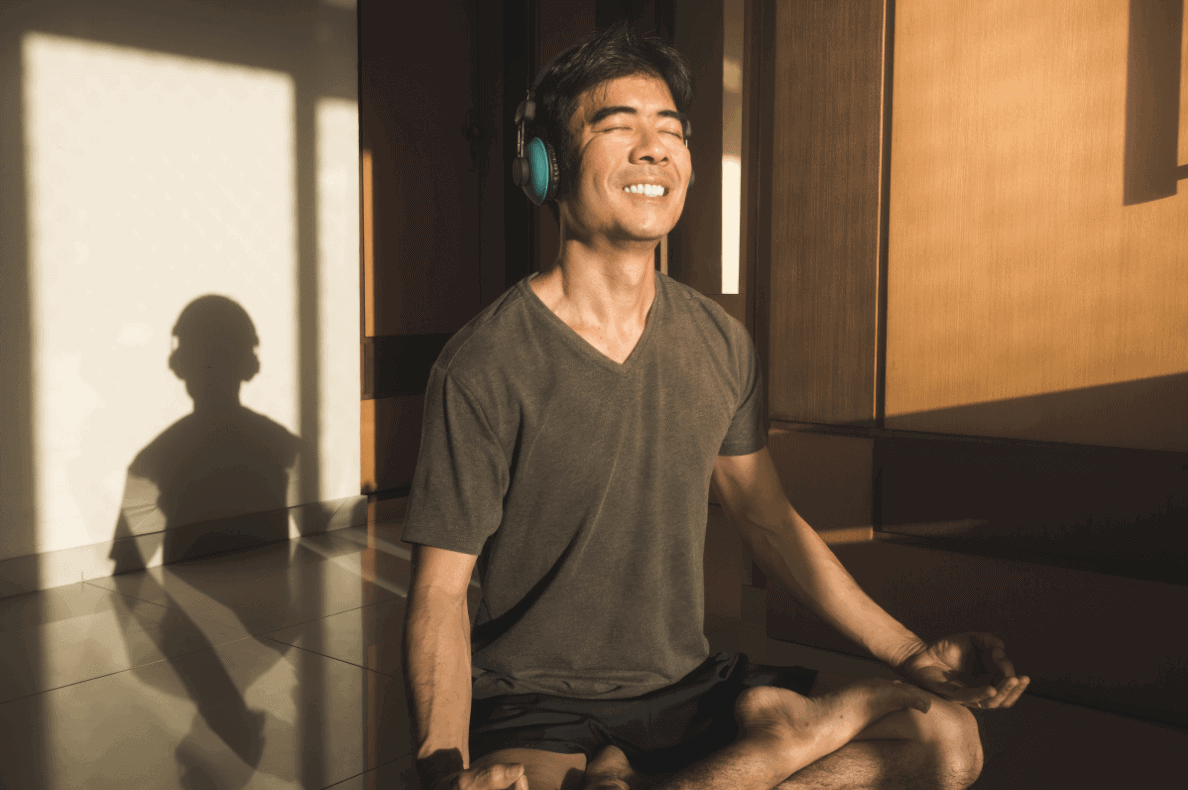
There is also an ever-growing treasure trove of other free and paid-for meditation material online. Insight Timer is my favourite meditation app for variety and the community aspect; the Calm app has a free “Let’s meet this moment together” section to soothe pandemic-related anxiety; and Australian Smiling Mind also has this dedicated “Thrive Inside” resources page.
Many of the world’s best-known meditation guides are busy sharing positive-mindset content on social media, and studios like “Unplug Meditaton” in California are streaming classes online to help us calm down too. Alchemy of Breath also runs free online breath-work meditation classes every Sunday which can help uplift our mood. Megan Monohan’s book “Don’t Hate Meditate” is a great practical introduction to building a practice.
3. Approach things mindfully
To me, being mindful means staying non-judgmentally aware of the present moment — rather than mind-wandering into thoughts about the past or the future (which has been shown to make us less happy). During difficult times it’s easy for our attention to drift to worries about worst-case scenarios that may never happen; when no one really knows what the future holds! It is prudent to be practical, but after that it is helpful to remember that we are usually safe in the present moment, rather than diving into negative thought spirals.
Meditation is a concentrated, dedicated period of mindfulness, but we can also practice staying mindful during — or to bringing our full attention to — other tasks.
A few easy ways to practice mindfulness include:
- The 3–2–1 method: stop and notice three things you can touch, two objects you can see and one sound you can hear around you;
- Close your eyes and counting five slow, deep breaths: feel how your body moves with each breath, notice how warm or cold your inhales and exhales feel;
- Going through all five of your senses individually (noticing sight, smell, sounds, tastes and touch) whilst cooking or eating a meal or a snack;
- Running your fingers up and down your own arms — from your shoulders to your fingertips — slowly three times;
- Each morning or night, write down three things you’re grateful for, no matter how big or small. This could be someone you know; things you like about yourself or where you live; what you ate or did that day; or an aspect of nature — like the sky, a flower or bird outside. Research suggests that gratitude practices can actually improve our outlook on life.
Some of my favourite books exploring mindfulness and living in the present moment include beautifully written “The Untethered Soul” by Michael A. Singer; the esoteric “The Power of Now” by Eckhard Tolle; and mind-blowing “Freedom From The Known” by J. Krishnamurti. You can also watch Tolle’s “Staying conscious in the state of adversity” video here.
4. Develop a new routine at home
Try to build some kind of routine at home — you might decide to wake up, go to sleep and eat at regular times; exercise on certain days; or diarise blocks of your calendar for work and other tasks. This can help to help maintain our sleep patterns, to eat more healthily and stress less.
It’s useful to list things you’d like to achieve tomorrow (highlighting three top priorities), as well as the week ahead in your journal, carrying any unfinished tasks forward to the next period. You can find tips on productively working from home online, like in these articles by the BBC and CNN.
If you’ve wanted to read a book (here are 10 books that totally transformed my view of life); learn a new skill (like a language); or take an online course (you can check many affordable or free ones out on Udemy or Coursera) but haven’t prioritised it — take this extra time indoors as an opportunity. Hal Elrod’s easy-to-read book “The Miracle Morning” suggests starting the day with exercise, meditation, reading, journaling and visualisation. I personally like to meditate each morning, exercise in the afternoon, and read before I go to bed to stay grounded. I mix up how I exercise, which books I read and my self care routine in general, depending how I feel that day.
To work on forming good habits, or getting rid of old ones, James Clear’s “Atomic Habits” is a great guide to getting started. Using a journal, a habit tracker, app or having an accountability buddy also helps us stay on track. To help my focus levels, I like listening to calming background music like this on YouTube, or Brain.fm.
What’s more, prioritise something that makes you laugh or feel joyful every day! When things feel difficult it’s particularly time for some guilt-free self-care. If you’re not feeling productive, be kind to yourself and go for a walk in the park instead; if you feel a bit down, watch a comedy series you like or call a funny friend; if singing, cooking or painting float your boat — set aside time to do them regularly. Doing things you enjoy is particularly important to keep your spirits up when life feels negative or overwhelming.
5. Take breaks from your tech
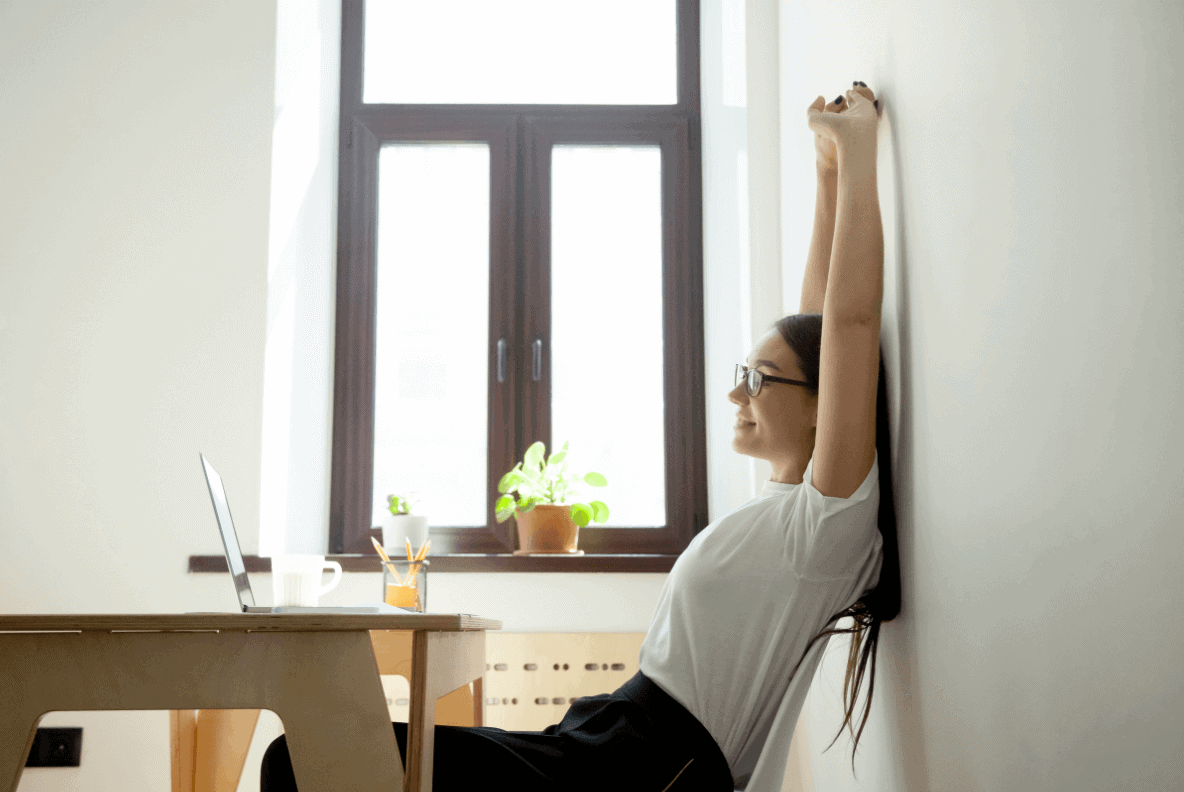
Being at home all day means many of us are spending more time than ever socialising, working, informing and entertaining ourselves pnline. The majority of Brits use their smartphones right up until bedtime and, in 2019, the average American checked theirs 96 times per day. Studies have linked heavy smartphone use to stress, depression and anxiety, with too much social media particularly found to affect our mood. Most of us have also likely noticed the associated effects of overuse on sleep, focus and productivity at home.
We can use usage-tracker apps like iPhone’s Screen Time, or Digital Wellbeing for Android to see how much time we spend on our devices — usually it’s far more than we consciously realise! Instagram and Facebook even have time management tools that you can set up to alert you after a usage period of your choice.
Other simple hacks can also help, like having a phone-free room at home (like your bedroom) or times of day (such as 9pm to 9am); turning off all-but-essential notifications; keeping your phone of arm’s reach when you are working; and deleting social media or other potentially time-wasting apps to de-clutter your home screen. After all, the reason we tend to have these apps on our phones is to stay up-to-date when we’re on the move. When we are mostly at home is a great time to practise app-minimalism!
Mind: Unlocked co-founder Niraj is a leading authority on the relationship between technology and the human mind, and has ran workshops on this topic for top executives at global firms including Cisco, EY (Ernst & Young) and State Street Bank. He’s summarised some of his top ideas in this article.
Also check out the brilliant book “How to Break Up With Your Phone” by Catherine Price for more detailed tips. It’s also an idea to dig out your paper books, board games, gardening, baking or exercise equipment for offline entertainment.
6. Moderate your news intake
It’s important to stay up-to-date with key developments, but if you start to feel overwhelmed by negative news, follow the CDC’s advice and take a break from it. Over half of participants in a 2018 study by the American Psychological Association said that the news causes them stress, with many experiencing anxiety or sleep loss as a result. This was before anxiety-inducing 2020!
Try not to have news running in the background at home — check once or so a day for updates, rather than all the time, and don’t watch it too late at night. Notice how you feel before and after you check the news. If you feel like you are compulsively checking, give someone you care about a call, or do something productive, like picking up a book instead. Alternatively you can check out Positive News, or interesting podcasts with expert interviews like The Tim Ferriss Show or Making Sense with Sam Harris.
Laughter is known to make us feel emotionally better, and can soothe physical tension, strengthen our immune system and relieve pain. Notice the small things that make you smile and, again, make sure you are regularly having fun doing things you enjoy — like baking,drawing, dancing, singing, speaking to friends who cheer you up, watching or reading something that makes you smile. Think about what lit you up as a child, and dedicate at least 30–60 minutes a day to activities that make you feel most happy and alive — instead of consuming anxiety-inducing content.
7. Connect with nature every day
Studies show that spending time in nature can have positive effects on our health — like lowering our blood pressure and boosting happiness.

Leave your phone at home if you can, and try to spend time outside in your garden or balcony, or go for a walk or run in the park or a natural space near you (if lockdown rules allow) every day. Take the time to mindfully take in your surroundings — like any trees, flowers or birds you spot. Focusing on distant views can also give our eyes a break from screen time at home.
Getting outside everyday can boost our sense of well-being, but you can connect with nature without leaving the house too. Commit to noticing how the sky, or other natural phenomena like trees, look outside each day — research suggests a window view of nature can even shorten the recovery time of patients. Owning a houseplant can improve our mood; and listening to recorded nature sounds (I love hearing the ocean whilst I work) or looking at images of green environments can also have calming effects on us. There are even “safari drives” streaming live from Kruger National Park, South Africa at sunrise and sunset. You could also install a bird feeder that you can see from inside, and try to spend a significant proportion of your day in a room with adequate sunlight to help boost your mood. Borrowing a doggy is another option to benefit from nature if you don’t have a pet yourself — check out this UK dog-sharing app to find a pup to take on a walk outside with you.
8. Prioritise your sleep
With all of the upheaval and uncertainty, many of us are finding it harder to nod off, with some of us also experiencing vivid dreams or nightmares once they do manage to. The American National Sleep Foundation recommends that adults get seven to nine hours of sleep per night; while the NHS explains here how being chronically under-rested can lead to serious health conditions — including anxiety and depression.
Developing a regular relaxing bedtime routine can help — such as having three things you regularly do, like reading a book, drinking a herbal tea, a bath, journaling, meditating or moisturising your skin (like a self-massage)! Make sure your bedroom is as quiet and dark as possible, and avoid mental over-stimulation and blue light from our screens in bed — which affects our sleep cycles — by charging your phone outside of the bedroom. If you have the willpower, you could also try putting your tech on airplane-mode at 9pm and not checking your messages until 9am; or using free desktop tool F.lux which aims to keep the light levels from our screens similar to that of our natural environment according to the time of day.
Meditation app Calm’s sleep stories have helped millions of people already, and HuffPost has some great tips here on sleeping better during pandemic-related anxiety. If you are interested in finding out more about our sleep quality’s effect on our health, Matthew Walker’s book “Why We Sleep” is full of practical information and tips based on sleep-science.
Mind: Unlocked’s unique meditation course also includes research-backed sleep, focus, creativity and stress-specific meditations to guide you through meditating to help with different issues we might face at different times.
9. Move your body each day
The UK government recommends healthy adults do at least 2.5 hours of “moderate” exercise every week. Physical activity has many mental benefits like improving cognitive function, boosting our perceived quality of life, and reducing anxiety and depression. If you’re used to feeling the positive effects of going to the gym or playing sports, which you can’t do right now, don’t worry! Many of the world’s top fitness studios like Barry’s Bootcamp, and instructors like Joe Wick’s The BodyCoach TV, have moved to streaming regular free or paid-for classes online during lock down. You can check out schedules for online classes by local studios near you (or any location you choose) using the MindBody app.
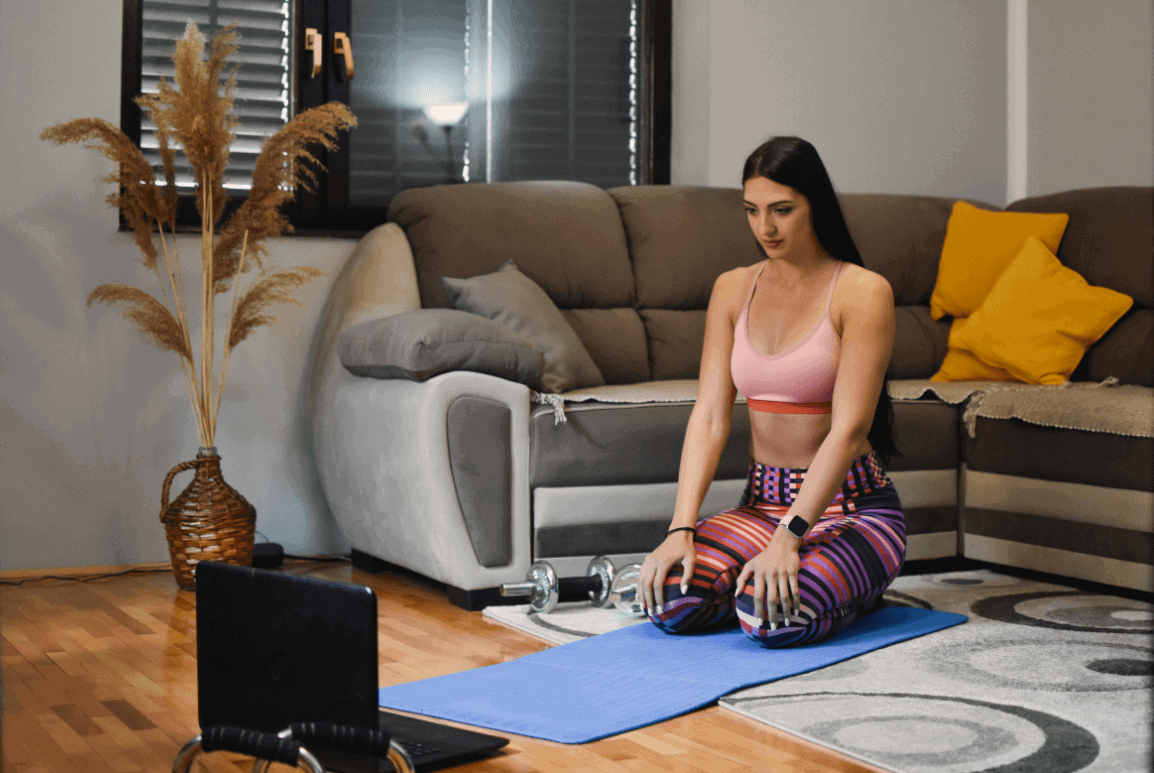
Research has found that low-intensity, strengthening movement like yoga (which also often includes a short meditation) can help calm us down during stressful times. Some of my favorite yoga teachers are also recording frequent classes from their social media accounts (like Ted McDonald on Instagram). I also love online ecstatic dance classes with URUBU or Rise Up — basically, an excuse to dance like no one else is watching from the comfort of your living room, whilst connecting online to people from all over the world.
As well as dancing, singing has multiple health benefits too, and listening to music we enjoy is known to uplift our mood. Try having your own dance party or sing-alongs with housemates (or by yourself) to your favourite tunes to make you smile!
10. Be kind to yourself, acknowledge and accept how you feel
Many of us are far harsher to ourselves than we would be to anyone else — practise being your own best friend instead. As I’ve said, if you don’t feel up to doing much — do what you can and know that you’re trying your best during an unprecedented, stressful time. This is also an opportunity to rest a little from “normal” busy life, and learn to be kind to yourself if you are not feeling 100% (or failing to meet unrealistic standards).
As spiritual thought-leader Sadhguru half-joked to his 2.9m followers during his daily Instagram talk, the general public could be saving lives just by staying home — “for once by doing nothing, we are doing something”.
If you are comparing your own to other people’s achievements during this time — notice what you’re doing and try to stop it. We all handle things differently at different times, and we never know what someone else is really going through.
Acknowledging difficult feelings — like anxiety, grief, or boredom — by sitting quietly and feeling where they come up in your, naming them without judgement and reminding ourselves something along the lines of “I’m anxious/grieving/bored now, but that is normal and fine, this feeling will pass” — after all these are not usual times! Sharing our feelings with someone we trust, even a mental health professional — can help us process and move through them, rather than repressing and paying for thatlater on.
Journalling or free-writing — committing to writing whatever comes up for you over a set time, or number of journal pages (even if that’s five minutes or three pages) without editing or censorship— can help our heads feel less cluttered. Recording our feelings during this weird year will also probably be interesting to reflect on in future — imagine telling the grand-kids!
Keep in mind, there can also be personal growth from times like these. Post-Traumatic Growth (PTG) is defined in the Harvard Business Review as “the transformative positive change that can occur as a result of a struggle with great adversity.” We can experience upsides like a greater sense of belonging, inner strength, compassion for others and gratitude when we find meaning in traumatic experiences like the pandemic and associated lockdown.

Other useful mental well-being resources:
As with any physical or mental wellness tool, check in with what feels useful to your own state before and after you practice, to help learn what works best for you. Here are some other pandemic-related mental health resources:
- Mental health charity Mind has this page dedicated to mental well-being and the COVID-19 outbreak;
- The Samaritans have an online chat, 24-hour phone lines and useful articles to support those dealing with depression and other mental health difficulties;
- The NHS has published useful tips for “Mental well-being while staying at home”;
- Mental health guidance specifically released by the World Health Organisation and the US Centers for Disease Control and Prevention (CDC);
- The American Psychological Association has a list of pandemic guidance here;
- This Psychology Today article on pandemic trauma is insightful;
- Mind: Unlocked has curated this free collection of fact -checked mental well-being resources, covering a range of topics.
If you are feeling unable to cope or overwhelmed, and speaking to someone close to you who you trust doesn’t help you feel better, above all contact your family doctor, The Samaritans or seek a professional counselor or therapist — it’s often possible to have sessions remotely, over the phone or online.
Final thoughts…
These can be uncertain, difficult times, where it is important to actively take care of the physical and mental well-being of ourselves and others around us.
Try whatever works best for you: meditate and practice mindfulness; build social connections; prioritise sleeping well; practise movement and a hobby you enjoy every day; regulate your tech use and consumption of negative news; and help others who are vulnerable, lonely or in particular need. Little and often can be best, as well as doing what feels right that day.
I hope that, as with many difficult life events, this collective stressful time will help us appreciate what’s important to us, our connection to nature and each other, and to live accordingly; as well as helping us to be resilient to whatever life throws our way.
By Mind: Unlocked Co-Founder, Jessica Warren


